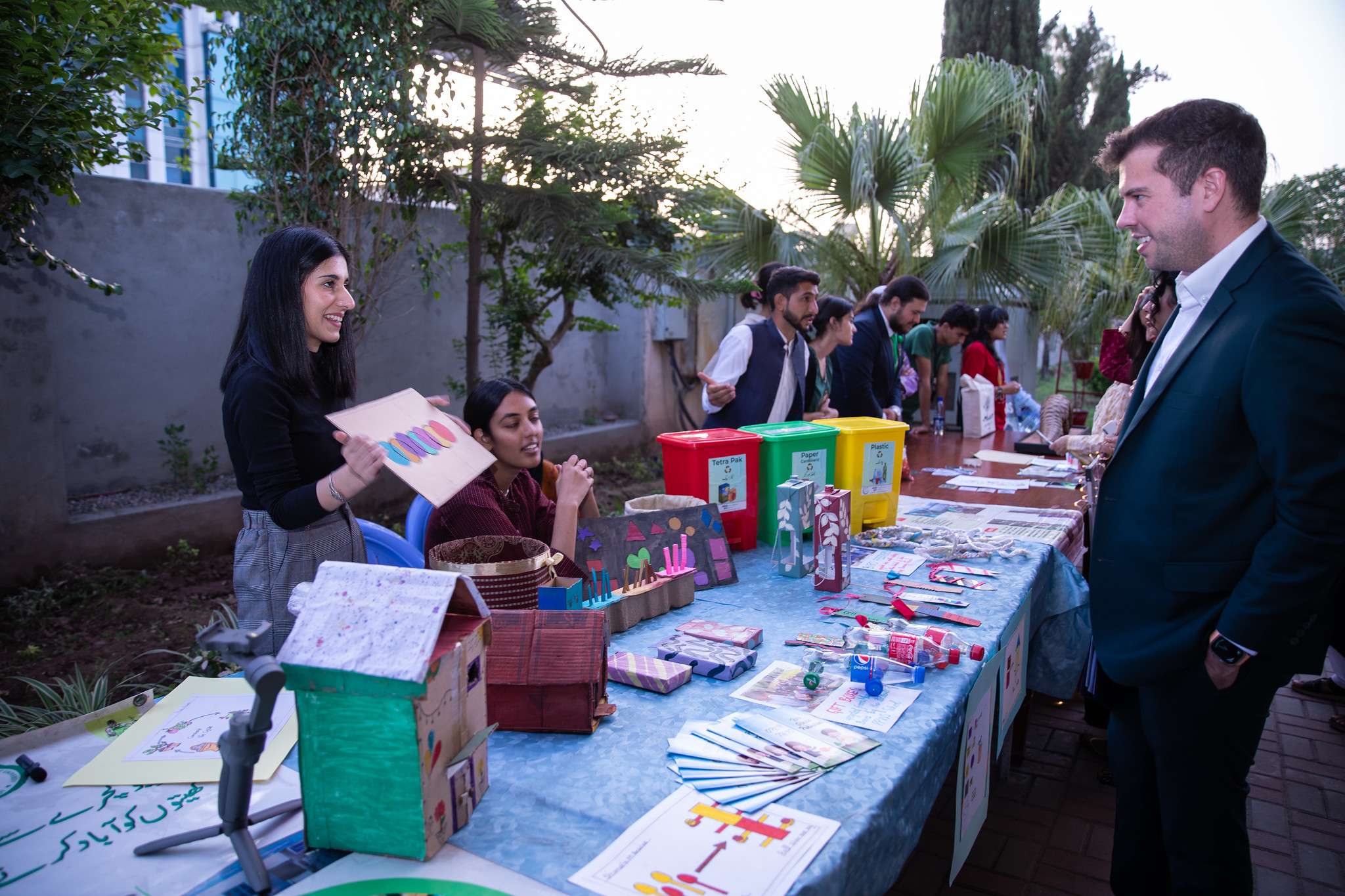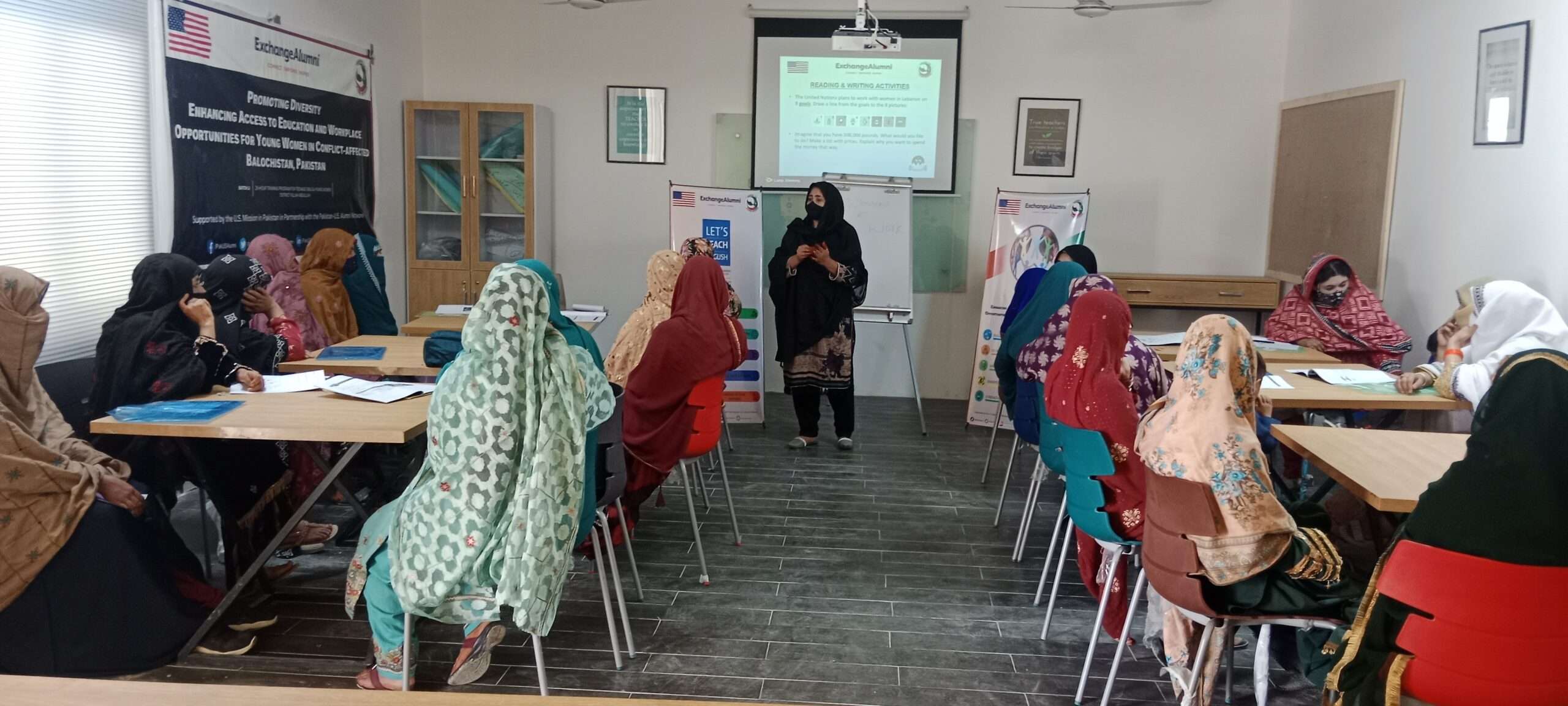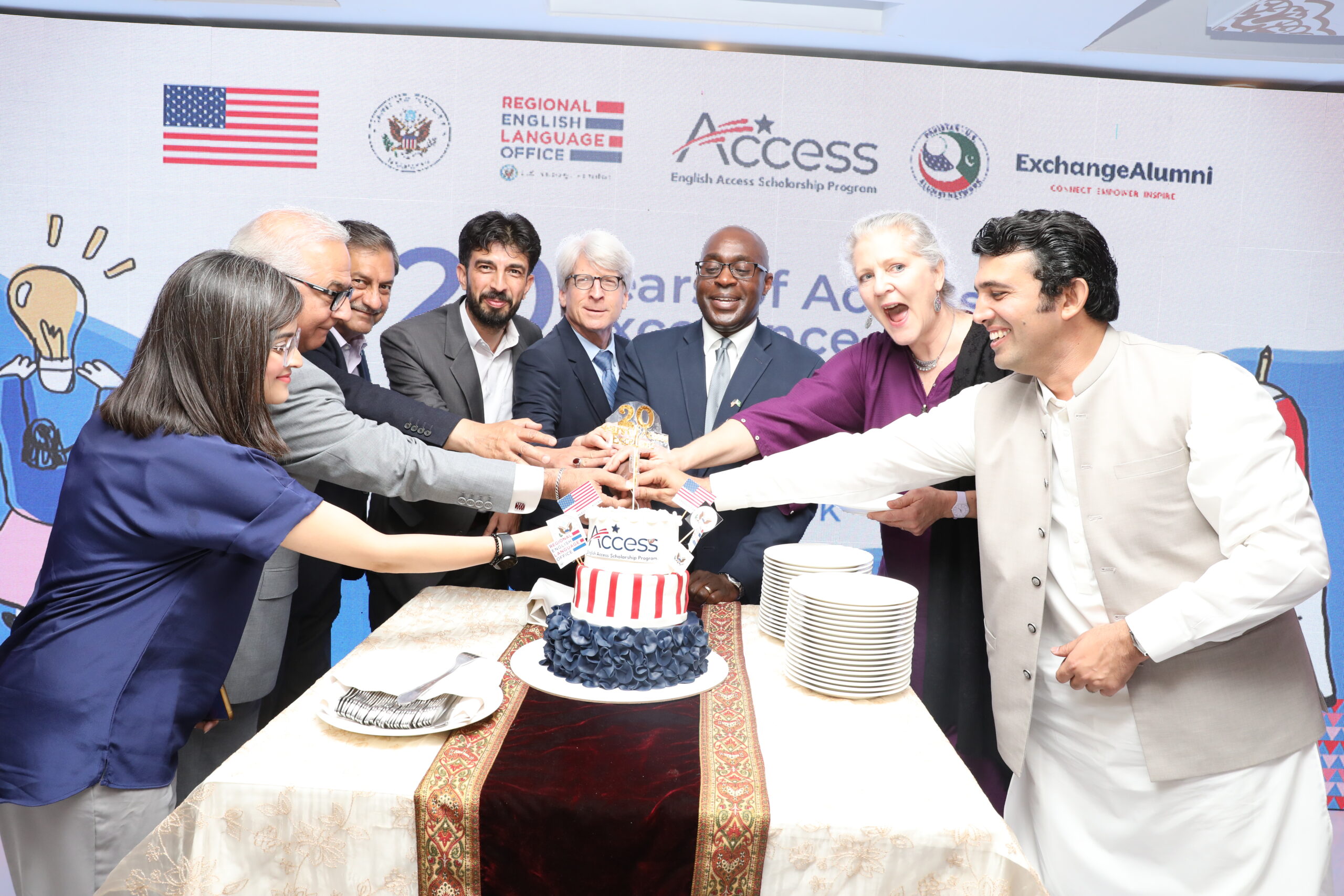A Glimpse into Environmental Solutions: Fulbrighters Tackling Climate Change
Home to breathtaking landscapes and diverse ecosystems, Pakistan bears the brunt of climate change’s wrath, from devastating floods to melting glaciers. Yet, amidst the challenges, hope emerges in the form of dedicated individuals and their unwavering commitment to a sustainable future.

The day II of the 17th Annual Fulbright Alumni Climate Change Conference on January 13, 2024 was also a testament to how can we diversify our perspectives and transform our individual researches in actionable solutions by igniting a spark of optimism in the hearts of listeners.
Panel Discussion: Climate and Environment
From Sindh’s Coasts to Baluchistan’s Mountains: A Landscape of Vulnerability and Resilience
Dr. Muhammad Ali Shaikh opened the discussion, painting a poignant picture of coastal Sindh, once a land of flourishing trade and the legendary Sassi-Punno romance. Today, sea intrusion claims 67 kilometers of land, cyclones rage with increased frequency, and freshwater dwindles, impacting a population predominantly under poverty. Yet, Dr. Shaikh’s words held a note of hope, highlighting the community’s spirit and the potential for adaptation.
In stark contrast, Dr. Faisal Khan shifted the focus to the arid plains of Balochistan. He explored the potential of carbon offset projects, citing Quetta’s green bus initiative and pioneering solid waste management system as exemplary models. These projects hold the promise of not only mitigating emissions but also fostering development and improving lives.
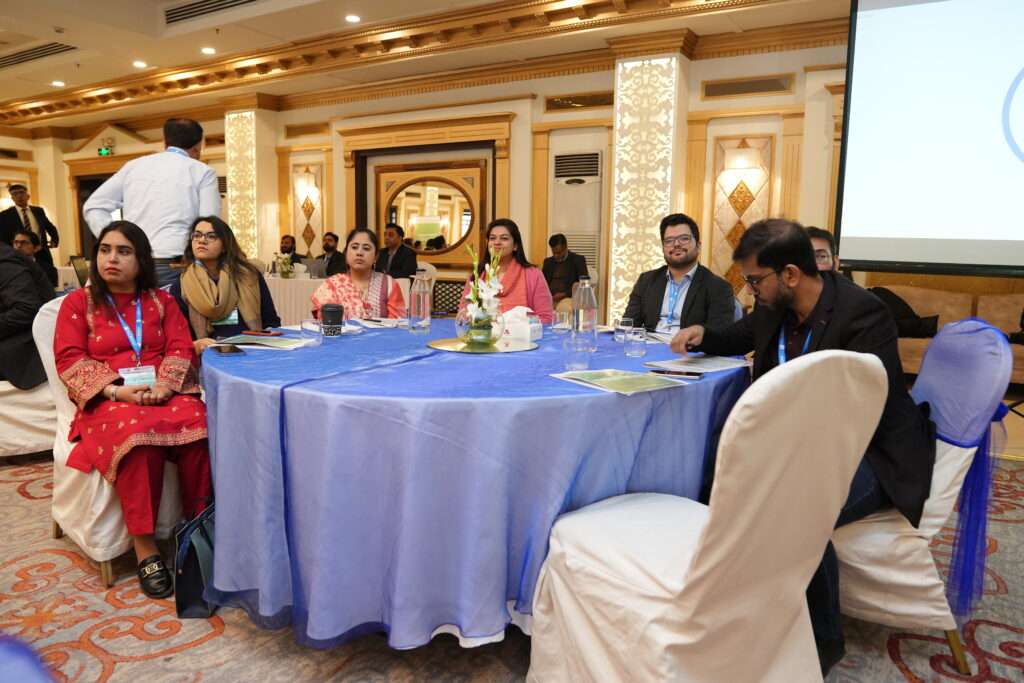

Data-Driven Solutions and the Power of Individual Actions
Mr. Salahuddin’s presentation emphasized the crucial role of data in navigating the climate crisis. He showcased how GIS software and historical data simulations can empower communities to manage flood risks and plan with foresight. His poignant reminder of the Attabad Lake tragedy underscored the need to learn from past mistakes and integrate climate considerations into every aspect of our development.
Dr. Fatima Hafsa shed light on the construction industry’s significant carbon footprint, urging participants to consider not just quantitative emissions but also the social implications of environmental choices. Her focus on recycled plastic in affordable construction offered a promising avenue for sustainable building practices.
Towards a Net-Zero Future: Collective Action, Embracing Change
The discussion culminated with Dr. Usman Salahuddin’s call for collective action. He presented the stark reality of the 51 billion ton gap between our current carbon emissions and the net-zero target, highlighting the diverse sources contributing to this alarming figure. However, his closing message resonated with optimism, emphasizing the crucial role of individual choices in transitioning towards a sustainable future.
Pakistan-U.S. Alumni Network-A Door to Unlock Exciting Opportunities for Members
Amidst the insightful discussions on climate change, Kelly Ryan, Public Diplomacy Officer, U.S. Embassy, Islamabad took center stage to illuminate the vibrant network of Pakistan-U.S. Alumni Network (PUAN). His presentation, brimming with energy and enthusiasm, showcased the diverse ways alumni can engage with PUAN and leverage its vast offerings. For those seeking intellectual enrichment, PUAN presents a treasure trove of Master Classes, where renowned experts delving into a multitude of subjects, from science and technology to entrepreneurship and social impact. These interactive avenues provide alumni with opportunities to broaden their knowledge, network with like-minded individuals, and stay at the forefront of their fields.
Beyond intellectual pursuits, PUAN fosters a spirit of service through Alumni Small Grant Program (ASG). These volunteer-driven initiatives tackle pressing social and environmental challenges, from promoting literacy and education to advocating for sustainability and climate action. Followed by the quick presentation Country Alumni Specialist Shahid Waseem, U.S. Embassy, Islamabad and Assistant Manager Waqar A. Khan Pakistan-PUAN responded to the queries of conference attendees about the network.
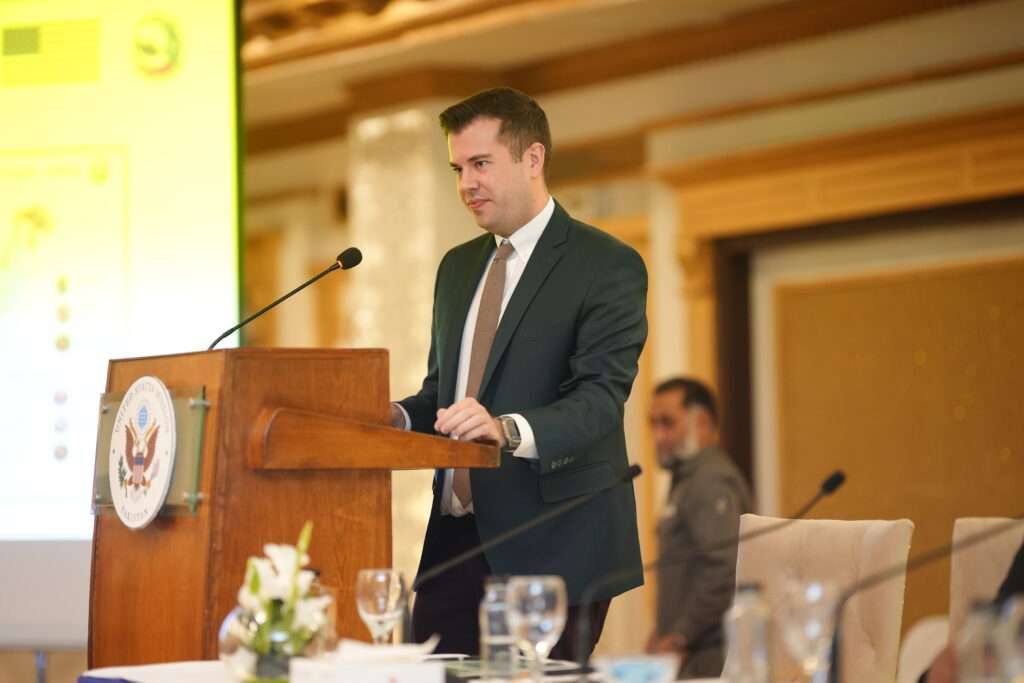
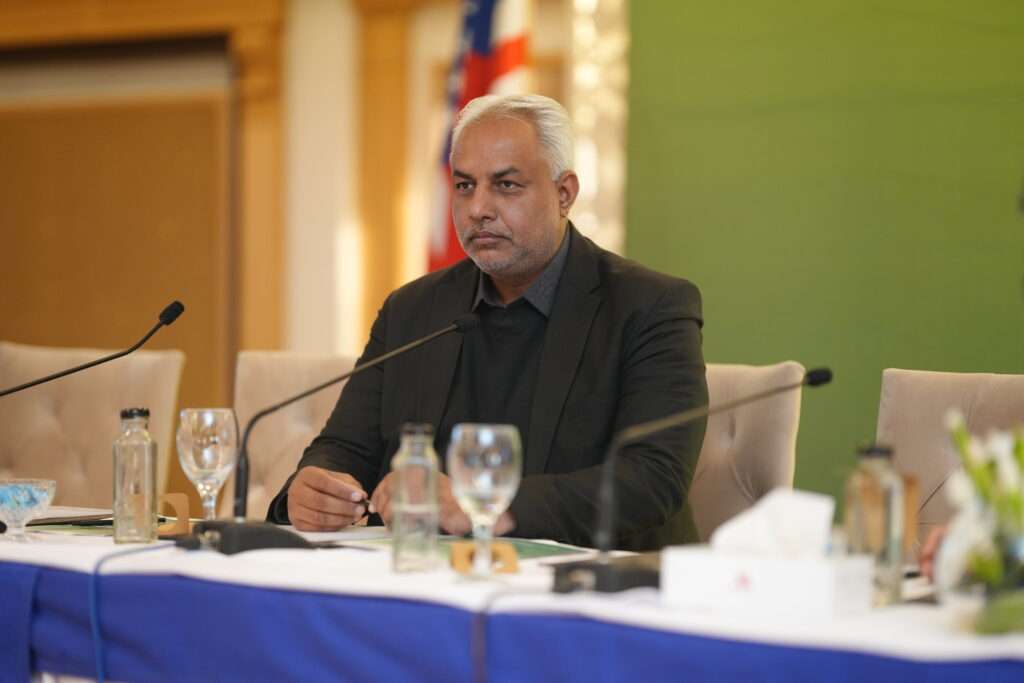

Panel Discussion: Green Business, Urban Planning & Architecture
Titled “Green Business, Urban Planning & Architecture,” the session brought together five Fulbright scholars, each armed with unique insights and actionable solutions to pave the way for a sustainable future. From circular economy pioneers to climate-conscious architects, the panelists painted a picture of Pakistan brimming with green potential.
Circular Economy: Closing the Loop on Waste
Mr. Salman Tariq, a champion of circular economy, launched the discussion by talking about Pakistan’s waste burden. His focus was on reducing waste at the source. From innovative refill stations for cooking oil, partnering with Unilever and incentivizing consumer behavior change, his initiatives tackle the problem at its root. The statistic that 60% of a product’s price can go towards packaging alone emphasizes the urgency of shifting toward reuse and refill models.
Taking the baton, Mr. Sajeel Sohail delved into the world of textiles, highlighting Pakistan’s denim industry as a beacon of sustainability. With AI-powered traceability and nano-bubble technology eliminating water waste, the industry stands at the forefront of innovation. With a fabric consuming just 10 liters of water per meter compared to the earlier 110, the commitment to resource efficiency is clear.
Reimagining Cities for People and Planet
The discussion then shifted to the urban landscape, with Ms. Abiha Batool lamenting Karachi’s status as the 8th worst-planned city globally. Her call for “functional and climate-centric cities” resonated with Ms. Marium Naveed, who challenged our reliance on cars for short trips. Rethinking urban design to encourage walking, cycling, and rideshare options, along with creating vibrant public spaces through “placemaking,” were highlighted as key strategies for building resilient cities.
Community Action at the Heart of Resilience
The final speaker Dr. Imran Saqib Khalid, brought the focus back to the human element. Dr. Tariq explored housing solutions adapted to diverse climatic conditions, emphasizing the need for context-specific solutions. He also underscored the importance of community-based adaptation, calling for nationwide assessments of extreme weather conditions and localized adaptation plans.

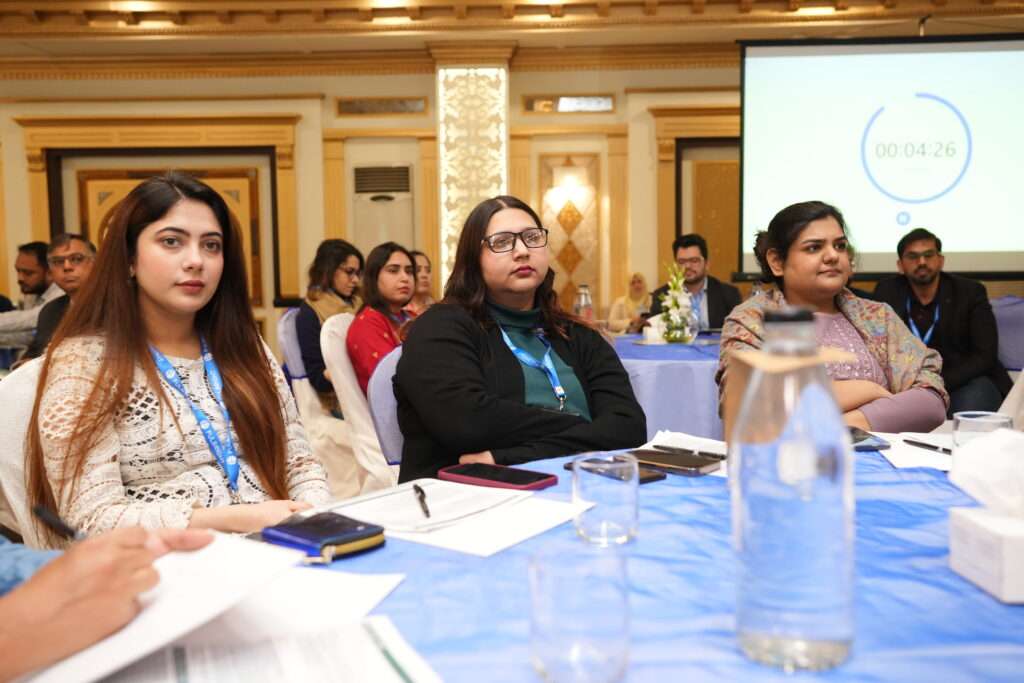
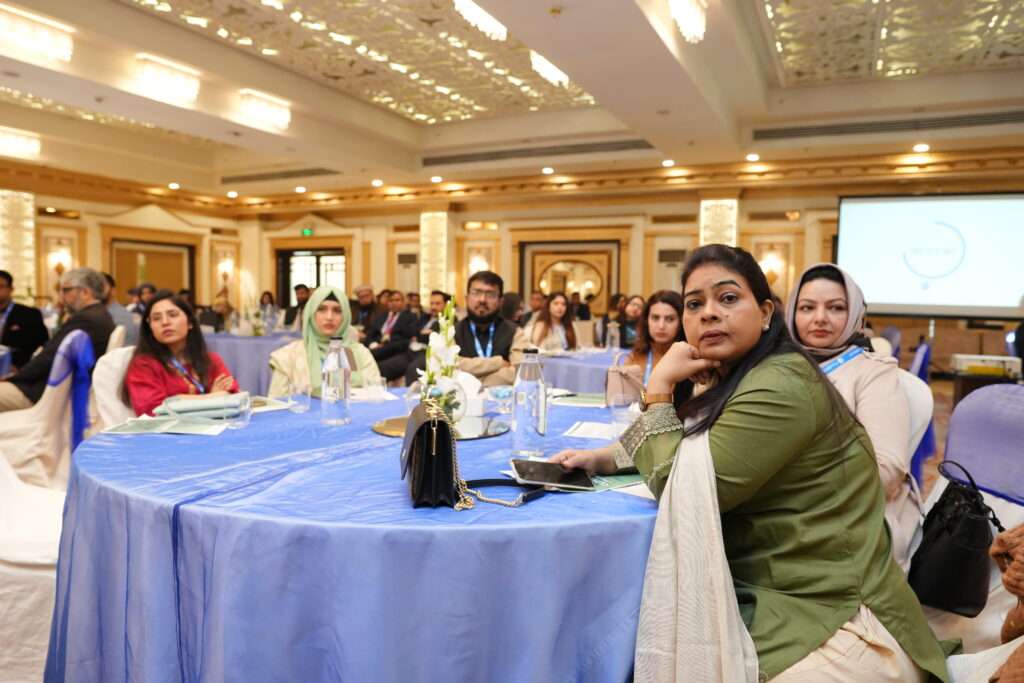
Panel Discussion: Agriculture
Pakistan’s vibrant agricultural sector, the backbone of its economy, faces an unprecedented challenge – climate change. From erratic rainfall patterns to rising temperatures and encroaching seawater, the very ground beneath Pakistan’s food security is shifting. Professor Dr. Habib Ali Bukhari did a great job by moderating the panel discussion on this theme by incorporating his expert opinion as a sectoral expert wherever needed.
Impact of Climate Change on The Agriculture Sector in Pakistan
Dr. Hira Channa highlighted the devastating consequences of extreme weather events, with floods giving way to droughts, leading to widespread food wastage and soil degradation. She championed organic farming practices as a way to mitigate carbon emissions and improve soil health.
The Incidence of Foodborne Pathogens to Climate Changes
Dr. Farman Ahmed shifted the focus to foodborne pathogens, emphasizing how rising temperatures create fertile ground for their proliferation. He stressed the importance of best practices in food handling and highlighted Pakistan’s alarming rate of child stunting linked to gut health issues exacerbated by climate change.
Crop Insurance: Securing Small Farmers Against Climate Change
Mr. Shan-e-Ahmed presented a pragmatic solution: crop insurance. He argued that securing farmers’ livelihoods through insurance schemes would equip them to bounce back from climate-induced crop failures and invest in new plantings. However, he noted the limitations of existing loan insurance with its meager payouts and high premiums.
Impact of Climate Change on Environment, Food, Security and Health
Dr. Jehan Bakht expanded the scope, encompassing the broader environmental and social implications of climate change. He raised concerns about Pakistan’s meager tree cover, excessive water consumption, and dependence on Indus water shared with India. Advocating for climate-resilient strategies and personal behavior change, Dr. Bakht also emphasized the need to address population growth.
Climate Change and Agriculture at The Cross Road
Dr. Fahd Rasul concluded the panel discussion by emphasizing the urgency of action. He highlighted how climate change disrupts traditional rainfall patterns, jeopardizing cotton production and pushing it southward. He advocated for embracing technology, particularly early warning systems, to navigate the changing climate and build preparedness.
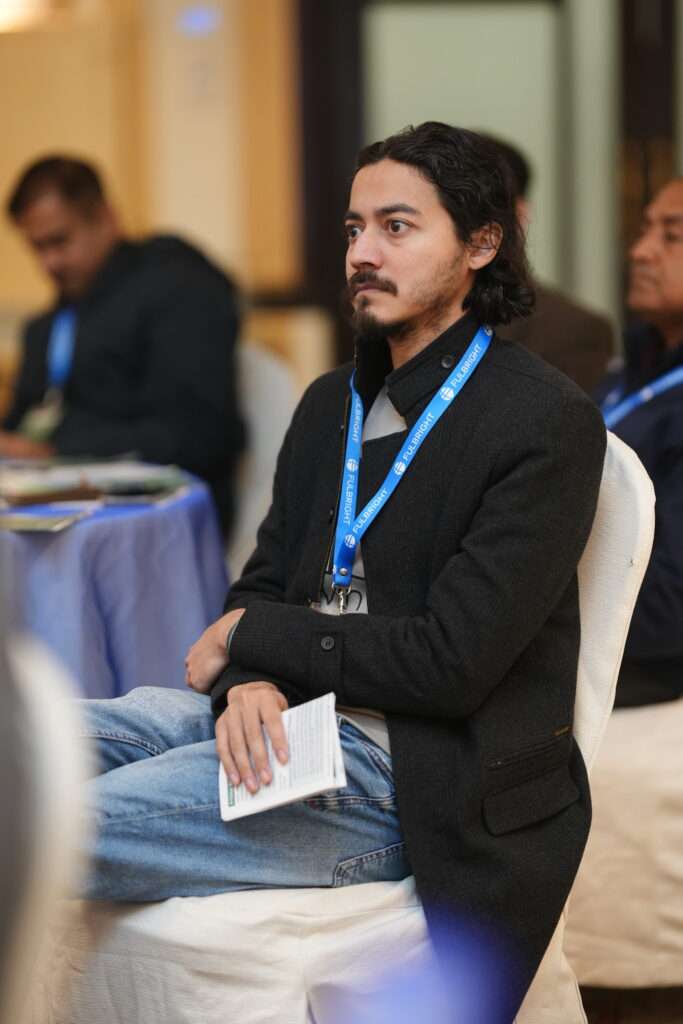
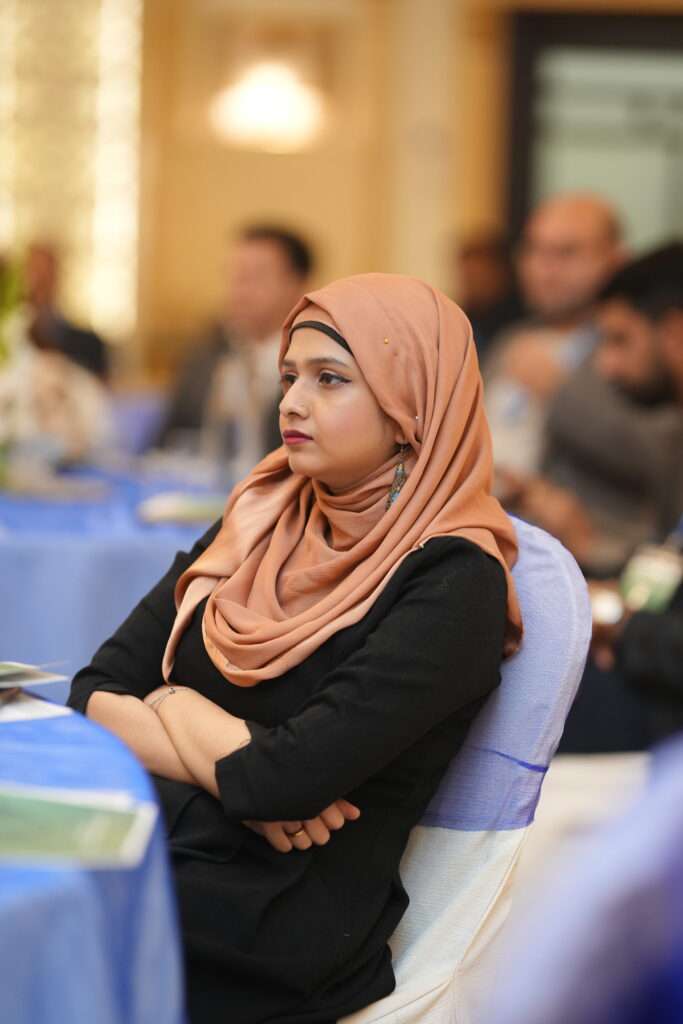

Panel Discussion: Animal Husbandry & Ecology
Impact of Climate Change on Livestock Production in Pakistan
The session, chaired by Dr. Jehan Bakht, unfolded like a captivating story, each speaker adding a vivid thread to the narrative. Dr. Sarzamin Khan, focusing on livestock production, painted a picture of dwindling resources and rising costs. As temperatures soar and water becomes scarce, fodder quality shrinks, and dairy products, a staple for many, become a luxury. The ripple effect, he emphasized, impacts not just cattle but the entire food chain. Recognizing the need for adaptation, Dr. Khan called for research into climate-resilient animal breeds, improved feed management, development of water reservoirs and reduction of carbon foot print.
Effects of Climate Change on Bakarwaals of Northern Pakistan
Ms. Sidra Khawaja, shifting the focus northwards, recounted the poignant tale of the Bakarwaals, nomadic shepherds whose traditional way of life is being upended by climate change. Worsening floods threaten their very existence, forcing them to abandon their migratory routes and adapt to an uncertain future. Ms. Khawaja’s words were a reminder of the human cost of environmental change, a cost borne not just by animals but by entire communities built around them.
Impacts of Climate Change on Marine Life
Dr. Khadija Haider plunged into the depths of the ocean, highlighting the often-overlooked impact of climate change on marine life. With rising temperatures and acidification posing existential threats to countless species, the very fabric of this vital ecosystem is unraveling. Dr. Haider’s call for urgent action, for robust conservation efforts and sustainable fishing practices, resonated with a sense of urgency and hope.
Role of Conservation of Local Flora and Fauna in Climate Change
Dr. Muhammad Yasir Zahoor emphasized the interconnectedness of all living things. He showcased the crucial role of local flora and fauna in maintaining environmental balance, highlighting the symbiotic relationship between animals and their habitats. This understanding, Dr. Zahoor argued, is key to designing successful conservation strategies that benefit not just individual species but the entire ecosystem.
The panel discussion offered more than just information; it was a call to action. From research into climate-resilient livestock to advocating for the Bakarwaals, from protecting marine life to conserving local flora and fauna, each speaker offered a path forward. The message was clear: we must act, in collaboration, to mend the tapestry of life that climate change threatens to unravel.
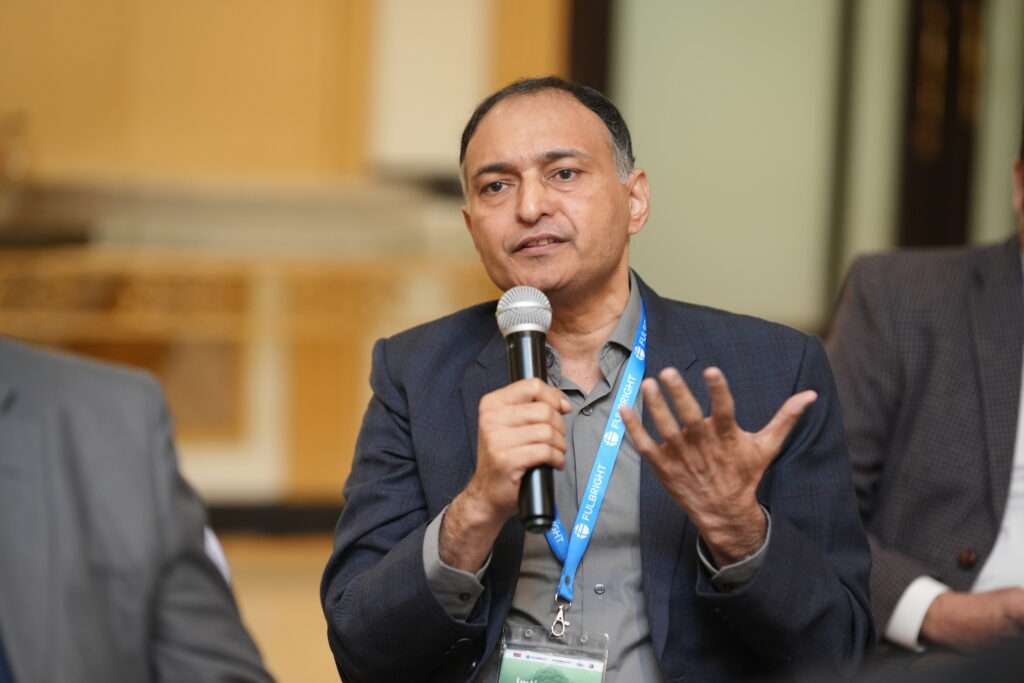


Panel Discussion: Climate Action & Technology
As climate change casts its shadow across the globe, finding solutions becomes an ever-pressing imperative. Under the theme “Climate Action, Technology,” the speakers navigated different lane in the intricate network of solutions.
Climate Adaptation and Resilience
Dr. Syeda Hafiza Benish Ali set the stage by exploring the crucial concept of climate adaptation and resilience. She emphasized the need for communities to prepare for the inevitable impacts of climate change, not just through infrastructure but also through social support systems and knowledge sharing. Her words resonated with the urgency to build the capacity of vulnerable populations to face the challenges ahead.
Effective Communication on Climate Change
Dr. Amad Hassen then shifted the focus to the critical yet often overlooked aspect of communication. He argued that effective communication on climate change is key to mobilizing public support and driving action. By dispelling myths, framing messages effectively, and engaging diverse audiences, Dr. Hassen stressed the importance of bridging the gap between knowledge and action.
Correcting Climate Change Requires Behavioral Change
Mr. Mohammad Ahsan Achakzai took a pragmatic approach, highlighting the necessity of behavioral change. He underscored that tackling climate change demands a shift in our everyday habits, from transportation choices to energy consumption. His call for individual responsibility served as a reminder that every small action, multiplied by millions, can create a significant impact.
Clearing the Air with AI & Nanotechnological Solutions for Mitigating Global Carbon Emissions
Dr. Komal Kamran and Dr. Aneela Anwar led the charge into the realm of cutting-edge technology. Dr. Kamran’s talk shed light on the potential of AI for smog and air pollution control, demonstrating how algorithms can optimize traffic flow, predict pollution events, and guide interventions. Dr. Anwar, on the other hand, delved into the exciting world of nanotechnology, showcasing its potential for capturing and converting carbon emissions into valuable resources. Their talks painted a vision of a future where technology becomes a potent weapon in the fight against climate change.

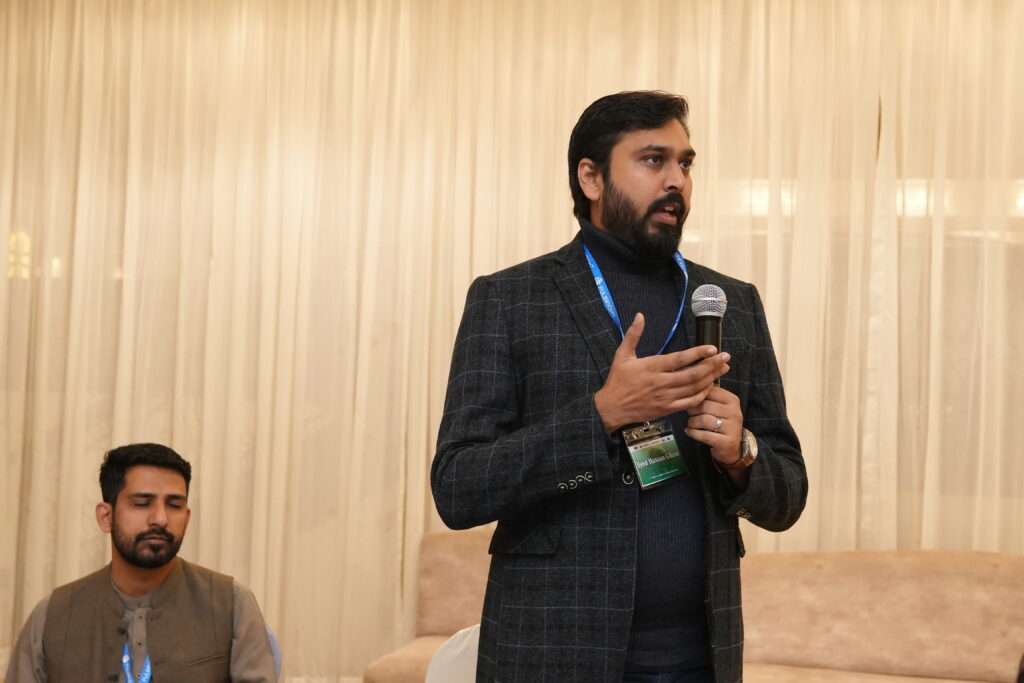
Panel Discussion: Education & Economics
The panel discussion on Education & Economics brought together six Fulbright scholars, each equipped with a torch of knowledge, to illuminate the intricate paths where education and economics intersect in the fight for a sustainable future.
Education in the Aftermath Of 2022 Floods in Pakistan – Lessons Learned
The panel discussion was presided over by Dr. Muhammad Ali Shaikh. Dr. Farah Nadeem led the way, drawing vivid lessons from the aftermath of the devastating 2022 floods. She underscored the need for disaster-resilient education infrastructure, adaptable curriculum, and psychosocial support for children traumatized by climate events. Her call for a proactive approach resonated with the urgency to prepare education systems for the ever-increasing intensity of environmental challenges.
Story Matters: Time And Tales of Climate Change in The Anthropocene Age
Dr. Zainab Younus then shifted the focus to storytelling, a timeless tool for engaging hearts and minds. Her presentation, “Story Matters,” highlighted the power of narratives to educate, connect, and inspire action. In the Anthropocene age, she argued, climate change demands stories that resonate with both local and global audiences, fostering a sense of shared responsibility and collective purpose.
Water Wonder: Indigenous Poetry and Climate Change in Pakistan
With “Water Wonder,” Dr. Muhammad Mahboob Ahmad took a poetic turn, showcasing the power of indigenous poetry to raise awareness about water scarcity and climate change. He explored how verses woven from ancestral wisdom can bridge the gap between traditional knowledge and contemporary environmental challenges, offering communities valuable tools for adaptation and resilience.
Impact of Climate Change on Education
Dr. Muhammad Aatir Khan then delved into the broader impact of climate change on education. He highlighted the disruption caused by extreme weather events, displacement, and resource scarcity, emphasizing the need for flexible learning models and equitable access to education despite environmental challenges. His insights served as a reminder that ensuring every child’s right to education is fundamental to building a climate-resilient future.
Climate Risk: Types, Identification, Quantification and Mitigation
Mr. Syed Humza, shifting the focus towards economics, introduced the concept of climate risk, demystifying its types, identification, and quantification. He emphasized the importance of risk assessment and mitigation strategies to protect economic activity and infrastructure from the impacts of climate change. His presentation equipped listeners with valuable tools to navigate the economic aspects of a changing climate.
International Climate Financing and Opportunities for Pakistan
Ms. Aisha Nazir explored the realm of international climate financing, painting a picture of potential opportunities for Pakistan. She shed light on existing funding mechanisms, highlighting specific programs and resources available to support climate action initiatives. Her message was one of proactive engagement and strategic resource mobilization to fuel Pakistan’s fight against climate change.
These panel discussion wasn’t merely an exchange of information; they were a call to action. They reminded us that tackling climate change demands a holistic approach, one that bridges the divide between education and economics. The Fulbrighters, like skilled architects, laid the foundation for a comprehensive solution, urging us to build upon their insights with creativity, adaptability, and unwavering commitment.
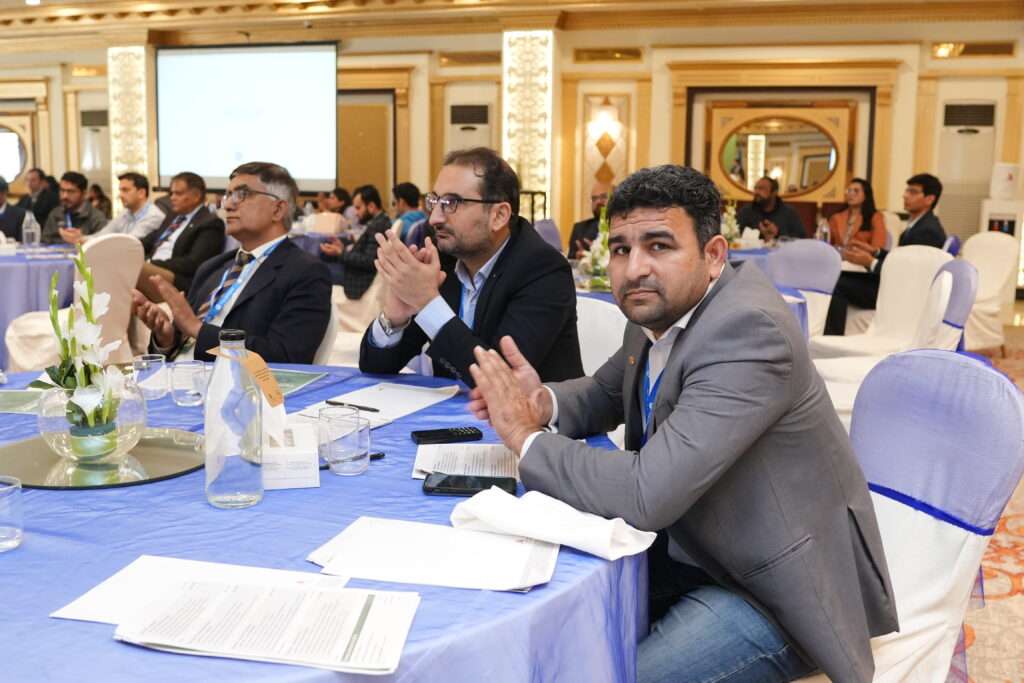
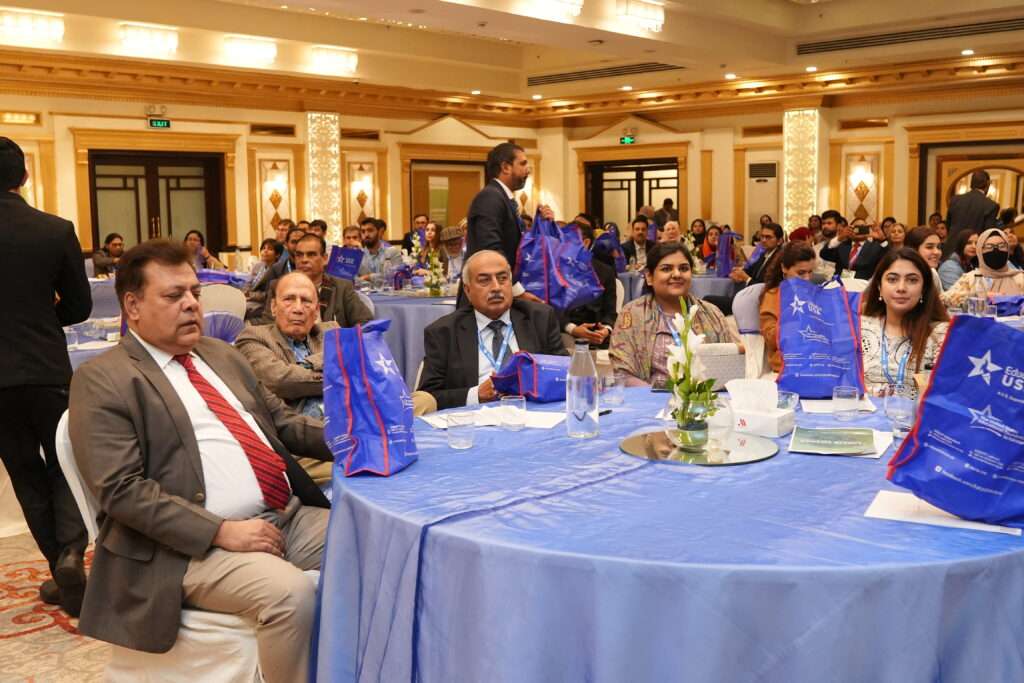
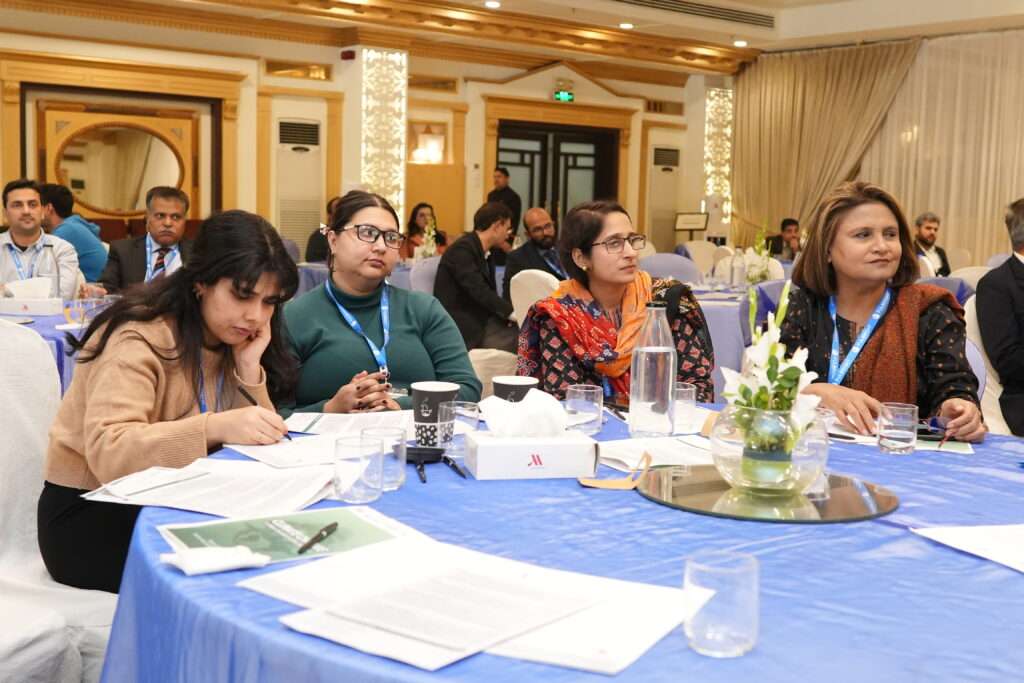
As we walk away from the day II of Climate Change Conference, let the echoes of these discussions guide our steps. We can all be champions of change, starting by advocating for climate-resilient education, promoting education through impactful storytelling, understanding and mitigating climate risks, and actively seeking international support for green initiatives. Together, with education as our foundation and sustainable economics as our cornerstone, we can build a future where Pakistan thrives in harmony with the environment, nurturing both its people and its planet.


